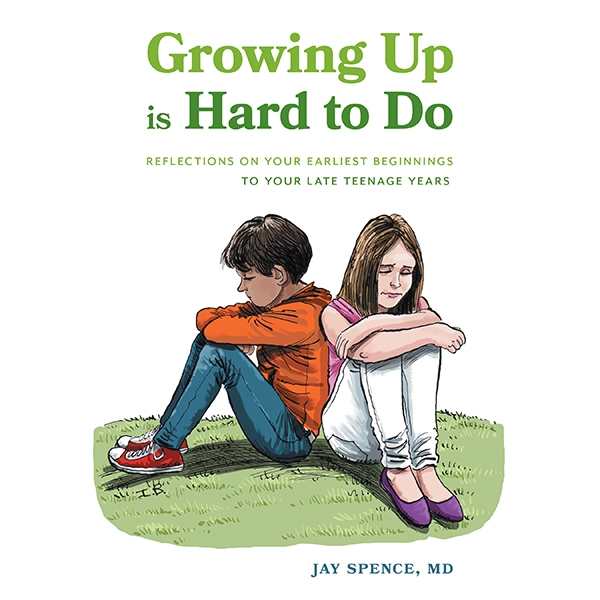Growing up Is Hard to Do
Reflections on Your Earliest Beginnings to Your Late Teenage Years
This is a book that adolescents would find helpful and reassuring during the turbulence of growing up, and hopefully, one which parents and teachers would endorse.
Written for young adults, Growing Up Is Hard to Do by Jay Spence offers a clear, authoritative explanation of life’s stages and challenges from birth through the teens.
Struck by the lack of a manual for growing up when he was a child, Spence, a retired Canadian physician, wrote this book as a kind of gift to his grandchildren but realized other young people could benefit from it. The doctor’s instinct was sound: Growing Up Is Hard to Do is an excellent guide to the first two decades of life. It offers both factual material and gentle guidance in text augmented by UK cartoonist Ian Baker’s superbly appropriate illustrations.
The book starts with an enlightening chapter about genetics, pregnancy, and birth. Following are fourteen additional chapters that trace human development from infancy to age eighteen, with a final chapter that addresses “becoming an adult.”
There is a fairly heavy concentration on what might be labeled the “problem years” of adolescence, with six chapters focused on sex and related issues, such as unwanted pregnancy, alternate sexual behaviors, and sexually transmitted diseases. Again, Spence’s instinct serves him well, since sex is a topic that at times may be neglected or taboo but that is at the core of the adolescent’s existence. The author’s writing in these chapters is particularly well done; he discusses sensitive subjects in a forthcoming, candid, and nonjudgmental way, aiming to provide accurate information rather than preach to the reader. The informal but anatomically correct illustrations of nude females and males at various stages of development are well executed and graphically supportive of the content.
Other issues are covered with equanimity. Writing about early childhood, for example, the author addresses the child’s growing independence, sometimes exhibited as antiparental behavior. A chapter regarding “lifestyle choices” discusses teenage obesity, anorexia, and bulimia in straightforward language. Two chapters do an admirable job of exploring risky and destructive behaviors such as smoking, drinking, and taking drugs. Included is the topic of teenage suicide, and again, this is handled sensitively.
Even the brief, finely constructed “Final Thoughts” are perceptive and helpful. Here, Spence writes: “None of us is perfect, or ever will be. We all have strengths and weaknesses; the cumulative result of our life experiences. Our character, moulded over the years, is difficult to change, but we must all work on our deficiencies and try always to be better people.”
Growing Up Is Hard to Do is written in a calm, level-headed voice that has a soothing quality to it, and the cartoon-style illustrations are a perfect complement to the text. While some of the subject matter is scientific and even technical, the author succeeds in explaining things in the simplest terms with remarkable clarity. This is a book that adolescents would find helpful and reassuring during the turbulence of growing up, and hopefully, one which parents and teachers would endorse.
Reviewed by
Barry Silverstein
Disclosure: This article is not an endorsement, but a review. The publisher of this book provided free copies of the book and paid a small fee to have their book reviewed by a professional reviewer. Foreword Reviews and Clarion Reviews make no guarantee that the publisher will receive a positive review. Foreword Magazine, Inc. is disclosing this in accordance with the Federal Trade Commission’s 16 CFR, Part 255.

